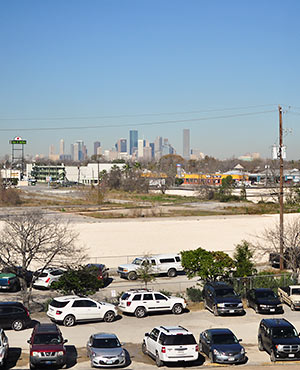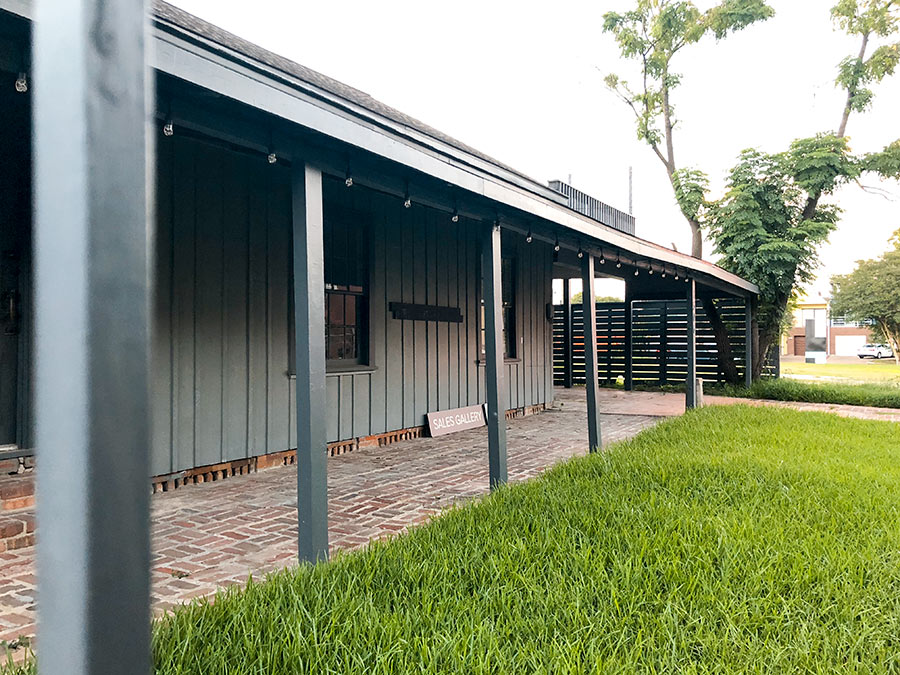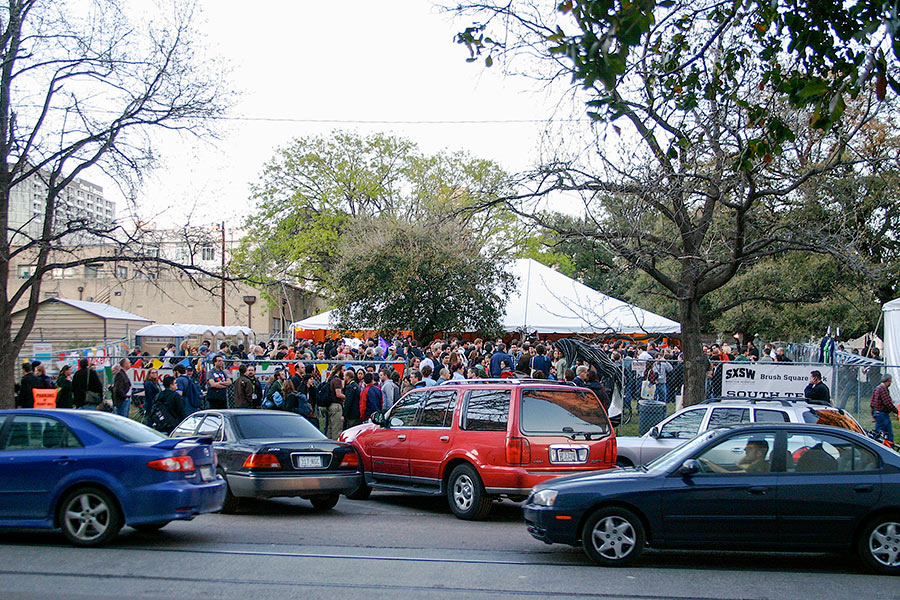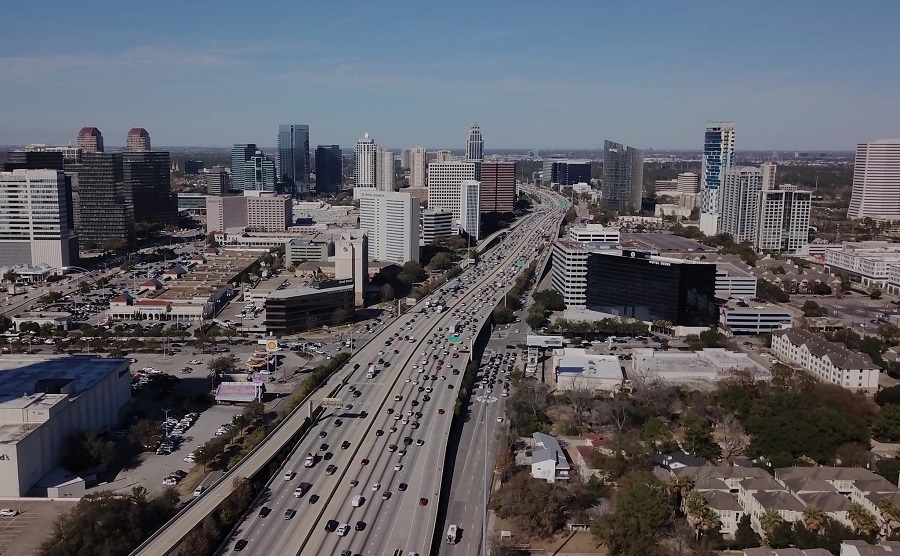HOW LIBERTARIANS DESCRIBE HOUSTON, PLAYING THE NEW YORK CARD, AND THE SUE ELLEN MISCHKE OF METROPOLISES  Cort McMurray stuffs more colorful Houston-in-a-phrase quips into his latest in-search-of-the-city essay than will fit in this little lookie-here linkpost, but a few are worth drawing out: “There is a wide difference of opinion on whether [Houston’s] messiness is a good thing. Some of us find it distressing. Tory Gattis and the other evangelists of ‘Opportunity Urbanism’ disagree, painting Houston as a sort of libertarian paradise, a place where fully actualized men and woman can work out their destinies through grit, brains, and good ol’ trial and error. Master plan? We don’t need no stinking master plan.
Surveys indicate that the majority of Houstonians are quite content to live in this Sue Ellen Mischke of metropolises: we love ‘the whole free-swinging, freewheeling attitude’ of the place, a city that offers us the strange comfort of knowing that no matter our neighborhood, we’re never more than 37 seconds away from a gas station, a Taco Bell, or an all-night tattoo parlor.
Eventually, all the world will be Houston, endless rings of toll roads forming concentric circles around some increasingly distant downtown, endless vistas of cars and Costcos and ‘lifestyle environments,’ worlds without end. This sprawl is ‘vibrant,’ and suburban ‘opportunity zones’ (opportunity is a key word for these people) are the inevitable result of vibrant, opportunistic people searching for better schools, better shopping environments, and better quality of life. In the Opportunity Urbanists’ perfect world, the Houston exurbs would stretch from the Sabine River to somewhere around Fort Stockton, and any suggestion otherwise amounts to a betrayal, a ‘de-Houstonizing’ of Our Fair City.” Another, more realist vision of Houston from McMurray’s grab bag: a spread-out, risk-graded, need-more-freeways array of poors-filled “gray zones” and haves-filled “safe zones.” [Houstonia] Photo: Candace Garcia
Cort McMurray stuffs more colorful Houston-in-a-phrase quips into his latest in-search-of-the-city essay than will fit in this little lookie-here linkpost, but a few are worth drawing out: “There is a wide difference of opinion on whether [Houston’s] messiness is a good thing. Some of us find it distressing. Tory Gattis and the other evangelists of ‘Opportunity Urbanism’ disagree, painting Houston as a sort of libertarian paradise, a place where fully actualized men and woman can work out their destinies through grit, brains, and good ol’ trial and error. Master plan? We don’t need no stinking master plan.
Surveys indicate that the majority of Houstonians are quite content to live in this Sue Ellen Mischke of metropolises: we love ‘the whole free-swinging, freewheeling attitude’ of the place, a city that offers us the strange comfort of knowing that no matter our neighborhood, we’re never more than 37 seconds away from a gas station, a Taco Bell, or an all-night tattoo parlor.
Eventually, all the world will be Houston, endless rings of toll roads forming concentric circles around some increasingly distant downtown, endless vistas of cars and Costcos and ‘lifestyle environments,’ worlds without end. This sprawl is ‘vibrant,’ and suburban ‘opportunity zones’ (opportunity is a key word for these people) are the inevitable result of vibrant, opportunistic people searching for better schools, better shopping environments, and better quality of life. In the Opportunity Urbanists’ perfect world, the Houston exurbs would stretch from the Sabine River to somewhere around Fort Stockton, and any suggestion otherwise amounts to a betrayal, a ‘de-Houstonizing’ of Our Fair City.” Another, more realist vision of Houston from McMurray’s grab bag: a spread-out, risk-graded, need-more-freeways array of poors-filled “gray zones” and haves-filled “safe zones.” [Houstonia] Photo: Candace Garcia





In reality, cities strive hard NOT to become like Houston. They admire the entrepreneurial spirit, but loath the city it produced. Even in LA, I’d hear people say, well at least we’re not Houston. Houston’s reputation is of a city that sees no value in its history and that sees preservation as an annoyance instead of an asset. I wish I had a dime for everyone around the country mention how much they hate Houston. I used to defend my hometown, but anymore I just don’t bother.
Does anyone else see the contradiction in arguments that Houston is creating homogenous sprawl, where everywhere looks the same, which is a bad thing, but their solution is to make Houston more like other (albeit less homogenous) cities?
One of the prevailing views by the outsiders of “anything goes” where a tattoo parlor or a waste treatment plant go right next door is simply not true. We have DEED RESTRICTIONS which prevent such things in 99% of neighborhoods. Sure there are some older neighborhoods that don’t have deed restrictions, but that’s really the fault of the residents choosing to buy in such neighborhoods and really don’t have a leg to stand on as far as complaints. Buying your home involves a lot of long term thinking including deed restrictions, adjoining non-resticted properties (ashby debacle) possible rights of way, street expansion, etc. I never hear many complaints inside River Oaks, The Villages, or even non-fringe parts of Sharpstown.
I like it and don’t care who doesn’t. It’s the spirit of this place. It isn’t for everyone, but then again Manhattan isn’t either. I’ve never felt the need to defend it, doesn’t matter. Everyone is free to move where they “fit” better.
Right Shannon! You can only fight so hard to defend the H, but when we really are getting it wrong, one starts to wonder… Boom and Bust, Boom and Bust. We will see it again and be left with all of this “Developer” construction rotting in the dust in 15-20 yrs. That is okay, we will just start over again… What a waste of material, time and energy!
Nevermind that the State enables the whole mess by constantly building more roads before any development even starts.
From the outside looking in you can’t understand it. From the inside looking out you can’t explain it.
Yeah, nobody in River Oaks ever complains about the Huntingdon or The River Oaks or The Bayou Bend all hovering over the neighborhood like monolithic voyeurs. I know plenty of people in RO who are not pleased with the state of Houston…and of course they’re thrilled with Hines new tower on their doorstep. What good are deed restrictions when someone can build a 500 foot building 4 blocks away. Yeah, as usual your argument makes soooo much “sense”
As a native Houstonian and an advocate for preservation, yet a person that has some grasp on our reality. Houston is the wonderful city that it is for all of it weird quirkiness, whether you see it as homogeneity or uniqueness. The reality is that Houston was established by real estate developers and contiunes to be reinterpreted by developers and if you don’t like Houston for what it is, leave. Houston certainly has its share of faults but overall, it is a great city. I have traveled all over the world, enjoyed diverse cities and cultures and always come happily home to Houston. I agree that the time is right for implementing some land use restrictions; although, not enough to be the person to lead a crusade, but would support some version. I challenge all of the people of Houston that bitch and rant about the shortcomings of Houston to get off their collective asses and rise to the challenge of initiating change, otherwise either shut up, leave, embrace it or just be an angry person.
The ones complaining in River Oaks are the cheapskates that bought homes right across the street from commerical or unrestricted property. Same rules apply, research your immediate neighboring property.
They should also receive no compensation because they were compensated by paying a lower price when they bought a home on the fringe.
@HD; as someone who is also a Native Houstonian, is in the A/E and development industry and DOES their best to enact change. I attend Planning Commission meetings, speaks at City Hall when development issues are tabled and represent many different Owners. It is hard when the cards in the deck are stacked.
We all do our individual part when and where we can… However, there comes a point when you just have to realize Houston won’t change. Cities like Barcelona, Frankfurt, Paris, Berlin, Basel, Rome etc… Have had eons to develop and get it right. Maybe in another couple of hundred years it will be a different story?
I think I’ve figured out why none of Houston’s one-liners fit.
.
Cities with fitting one liners – New York City, “The Big Apple,” are great places to visit. They rely on massive museums, theaters, opera houses, monuments, and that sort of thing to attract visitors from all over the world. But they don’t really cater to their residents. Have you priced real estate in New York City lately? Would you pay nearly $200,000 for a small apartment with no balcony in The Bronx?
.
Houston, by contrast, is a great place to live. With plenty of jobs and an affordable cost of living; with a variety of neighborhoods to fit all tastes. Sure, we have museums and theaters and opera and monuments – but we don’t rely on those to attract visitors. They’re for us to enjoy on weekends, or stay cations when we don’t feel like flying to New York.
.
The problem is, “Houston, a Great Place to Live'” doesn’t really cut it as a slogan. It’s terribly unimaginative, cheesy even. Small towns across America took dibs on it back in the 1950s. So why don’t we just call it Houston? No slogan. We all know what Houston is to us.
Shannon, is it safe to assume many of your friends reside in wealthy west/east coast cities where income inequality is off the charts and people leave in droves to the outer ‘burbs once they have to raise a family or can no longer afford to live in the inner city due to lack of affordable housing? I would laugh out loud if I ever heard someone in river oaks complain about condo towers, still laughing now actually. Houston is in more ways than not, just like all the other sunbelt cities and trying to make us sound as if we’re a lone bunch of free-wheeling liberterians in comparison to the rest of the entire southern region is quite a bit off the mark, if not downright ignorant.
***
i’ve heard tons of complaints about Houston in my travels and they all hinge around three things: weather, traffic and it’s in Texas. most complaints could probably just boil down to the fact that we’re not a tourism city and most folks that come through Houston go straight out to the suburbs to begin with, but not once have i ever heard someone complain about a lack of preservation in Houston outside of Houston itself or in some newspaper article in a land far away.
***
I may have varying opinions on lots of different subjects, but where i choose to live will always come down to two main things: quality of life and access to high-paying jobs. I have yet to find a city in the US that can beat Houston in these areas. I have yet to find a city with an area like the montrose that has lower rents.
***
perhaps I’m just ignorant in regards to this all though. exactly what has houston lost from our lack of preservation? what other large dynamic cities with growing economies have preserved their low-density buildings/neighborhoods around the city center. is this about preserving architecture or history,, and in what way does one or the other add to the value of houston for houstonians? in what way do our current historic districts, and preserved buildings not fully satisfy this need? blanket statements of preservation bring up terrible images of income inequality and rentier societies that favor old landowners in my mind though. if you want to enact change then you need good arguments with clear points of value to the community. i’m not sure these have been offered up fully and making mention of tourist cities in europe that are playgrounds for the wealthy is not the right foot to start on.
Anyone who thinks Houston is particularly ugly has never visited non-tourist* parts of other cities. I have traveled by train or car to almost every major city east of the Rockies. For all the heat and air generated on this subject Houston doesn’t look all that different through the extent. The only real difference is that our costs are lower than expected given our size.
–
*When most people think of cities they have visited as a tourist they are thinking of those cities’ Downtowns, Museum Districts, Memorial Parks, Medical Centers, Herman Parks and zoos, Highland villages Gallerias, River Oaks, Heights, Montroses**. In particular, has anyone visited Chicago University and taken some time in the surrounding neighborhood. I had to go by train and bus, nothing charming about the neighborhood or its approach once you get off the train.
**When you go to a gritty dirty neighborhood in another city it is amazing how authentic and cool it is. When you live in the gritty dirty neighborhood of your own city it is just gritty and dirty, although that will not stop swamplotters from complaining about gentrification cleaning it up.
The only fault I can find with Houston’s development style is that it’s still effectively under the thumb of the dollar. What would be intriguing to see is the local construction industry get a political upper hand on the dollar and start calling its own shots.
You will know it’s happened when conspiracy theories about the price of housing rivals the conspiracy theories about the price of oil/gallon of gas/etc.
Ideally the construction industry would move the yardsticks itself towards things that are harder to build (such as de facto LEED-style certifications) but which bring in a higher premium. Companies could then build their economies of scale locally and subsequently export this technology and/or products internationally.
Irrespective of how it turns out, this would be preferable to being beholden to the dollar (including banks and interest rates and the whole finance thing). This would be a way to mitigate occurrences that happen at a national/federal level, such as the relatively-recent housing/financial collapse, which have been known to have outsized repercussions within regional economies.
I always find it amusing when people who have no idea what a libertarian is decide to describe them.